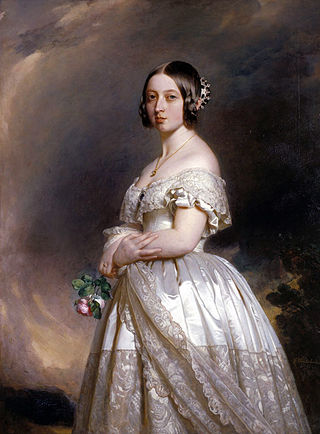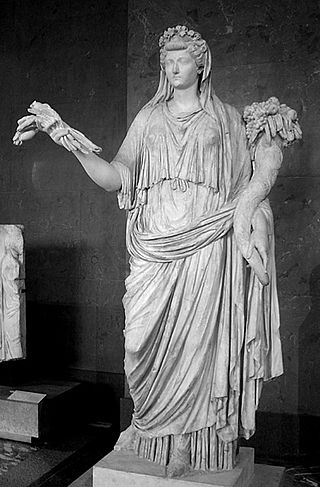See also
Name list
This page or section lists people that share the same given name. If an internal link led you here, you may wish to change that link to point directly to the intended article.
Trish is a feminine given name, often a contraction of Patricia. It may refer to:
Amy is an English feminine given name, the English version of the French Aimée, which means beloved. It was used as a diminutive of the Latin name Amata, a name derived from the passive participle of amare, “to love”. The name has been in use in the Anglosphere since the Middle Ages. It was among the 50 most popular names for girls in England between 1538 and 1700. It was popularized in the 19th century in the Anglosphere by a character in Sir Walter Scott's 1821 novel Kenilworth, which was based on the story of Amy Robsart. Enslaved Black women in the United States prior to the American Civil War were more likely to bear the name than white American women because slave masters often chose their names from literary sources. The name declined in use after 1880 but was revived due to the hit song Once in Love with Amy from the 1948 Broadway musical Where's Charley?. The name peaked in usage in the United States between 1973 and 1976, when it was among the five most popular names for American girls. It remained among the top 250 names for American girls in the early 2020s.
Amanda is a Latin feminine gerundive name meaning, literally, "she who must be loved". Other translations, with similar meaning, could be "deserving to be loved," "worthy of love," or "loved very much by everyone." Its diminutive form includes Mandy, Manda and Amy. It is common in countries where Germanic and Romance languages are spoken.
Maggie or Maggy is a common short form of the name Magdalena, Magnolia, Margaret, Marigold.

Victoria is a feminine given name. It is also used as a family name.

Samantha is a feminine given name.

Sarah is a common feminine given name of Hebrew origin. It derives its popularity from the biblical matriarch Sarah, the wife of Abraham and a major figure in the Abrahamic religions. It is a consistently popular given name across Europe, North America, and the Middle East — being commonly used as a female first name by Jews, Muslims, and Christians alike, and remaining popular also among non-religious members of cultures influenced by these religions.
Megan is a Welsh feminine given name, originally a diminutive form of Margaret. Margaret is from the Greek μαργαρίτης (margarítēs), Latin margarīta, "pearl". Megan is one of the most popular Welsh-language names for women in Wales and England, and is commonly truncated to Meg.

Patricia is a feminine given name of Latin origin. Derived from the Latin word patrician, meaning 'noble', it is the feminine form of the masculine given name Patrick. Another well-known variant is Patrice.

Kate is a feminine given name, and a short form of the names Katherine, Caitlin and others.

Nancy is an English language given name for women. The name Nancy was originally a diminutive form of Annis, a medieval English vernacular form of Agnes. In some English dialects, "mine" was used instead of "my" and "Mine Ancy" eventually became Nancy. The name was also later used as an English diminutive of Anne or Ann. It has been used as an independent name since the 18th century. In some instances it replaced variant Nanny, which was associated with the stereotype of a common, promiscuous woman from the 1600s onward. Spelling variants in use include Nancea, Nancee, Nancey, Nanci, Nancie, Nancsi, Nancye, Nanncey, Nanncy, Nansee, and Nansi. Similar names include Nan, Nance, Nanette, and Nannie.
Natalie or Nathaly is a feminine given name of English and French origin, derived from the Latin phrase natale domini, meaning "birth of the Lord". Further alternative spellings of the name include Nathalie, Natalee, and Natalia/Natalija.

Jennifer, also spelled Jenifer or Jenefer, is a feminine given name, the Cornish form of Guinevere, that became popular in the English-speaking world in the 20th century.
Jenny was originally the diminutive form of Jane, but it is now associated with Jennifer.
Grace is a female name from the Latin gratia. It is often given in reference to the Christian concept of divine grace and used as a virtue name.
Ellie or Elly is a given name. The name stands on its own or can be a shortened form of any of the numerous female names beginning with the syllable El-, in particular Elizabeth, Eleanor, or Elvira. It can also be a short form of Elaine, Elena, Eliora / Eliorah, Michelle, Elnaz, Amelia, Elham, Elaheh, Eliana, Eloise, Emelia, Elisa, Ellisha, Elisha, Elesha, Shelly, Eleni, or Petronella and as a masculine name of Eleazer, Elliot, Elron, or Elston. In Greek mythology, Ellie (Helle) was the daughter of Athamas and Nephele; sister of Phrixus.
The name Brooke is most commonly a female given name and less commonly a male given name, also used as a surname. Other forms include Brook. The name "Brooke" is of English origin.
Stacy, sometimes spelled Stacey, Staci, Stacie, or Stacii, is a common first name for women and men.

Naomi or Noemi is a given name of both biblical Hebrew and (separately) Japanese origin, used in various languages and cultures.
Carrie is a female given name in English speaking countries, usually a pet form of Caroline or Carolyn. Other spellings include Cari, Kari, Karie, Kerry, Carri, Karri, Kerrie, Kerri, Keri, Cerry, and Karrie, as well as various other spellings. Related names may include Carol, Caroline, Carolyn, Carolyne, or Carolynne.
Tracy, as a British personal name, was originally adopted from Norman surnames such as those of the family de Tracy or de Trasci from Tracy-Bocage in Normandy, France. Derived from the Gaulish male name Draccios, or Latin Thracius, and the well-identified Celtic suffix -āko, such Norman surnames themselves sprung from several Tracy place-names in France.